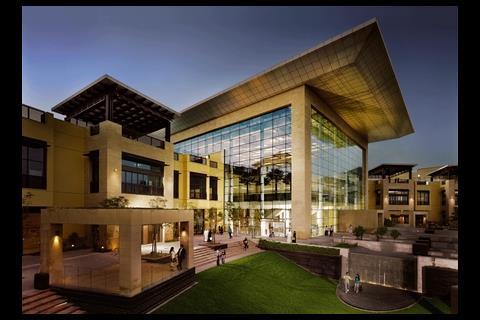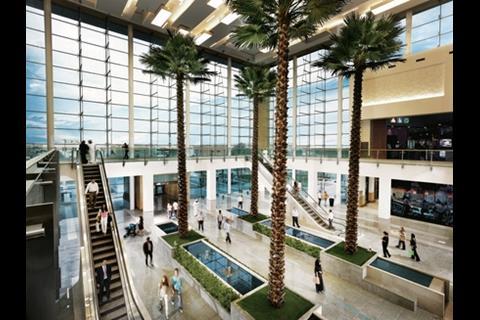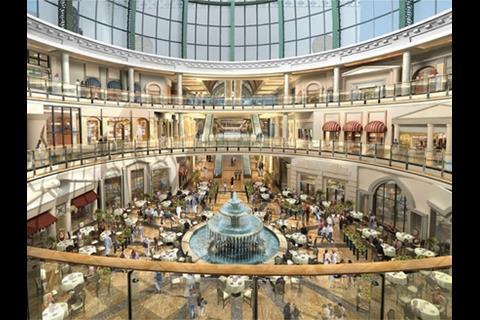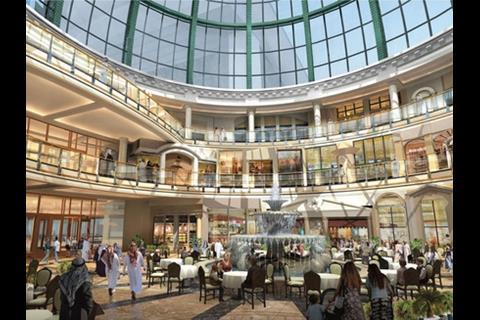You don鈥檛 have to be British to work for the Majid Al Futtaim Group but it certainly helps. Having built 10 malls in the Middle East, MAF now has plans for another 10 and, it wants you in on the shopping spree
Have you ever wondered whose idea it was to build that ski slope, complete with real snow, lifts, pine trees and even the delights of apr猫s ski, in the middle of the Arabian desert? Well, meet Majid Al Futtaim Group. And if you鈥檙e interested in working in the Middle East and the name doesn鈥檛 ring a bell, it鈥檚 time to get to know them better.
The privately owned conglomerate, which made a turnover of 拢300m in 2007 (its last reported results), engages in a range of business activities. The real estate division, MAF Properties, is the most prominent shopping centre developer in the Middle East, and the bit of the operation most likely to give you work. Since its inception in 1992, it has built 10 malls, including the region鈥檚 first ski destination, the Mall of the Emirates in Dubai. It also has plans for 10 more massive shopping centres in the next five to 10 years, with the first four alone worth 4bn dirhams (拢715m) and totalling 850,000m2 in area. Running this huge construction programme is a familiar figure: Jon Emery. The former UK director of Hammerson, who counts Birmingham鈥檚 rebuilt Bullring shopping centre among his achievements, joined MAF Properties 18 months ago as senior vice-president of projects and will be in charge of selecting firms to help bring more retail (and possibly snow) to the Middle East.
The good news is, he wants your help. He says: 鈥淏ritish firms have built up huge expertise from the malls we have done in the region, so they have an advantage with us. I鈥檓 still interested, as I was at Hammerson, in working with smaller, lesser-known architects. In particular, I would be absolutely delighted if some of the UK international contractors came to talk to me about our upcoming projects.鈥� But working for him won鈥檛 be an easy ride, as 黑洞社区 found out when Emery and his team took us on a tour of MAF projects around Dubai 鈥�
Where the work is
We meet Emery at Mirdiff City Centre, a 3bn dirham (拢537m) shopping mall (pictured on this spread) that MAF opened just days ago. The mall may be Dubai鈥檚 best yet: 196,000m2 of neutral (not 鈥渢oo Western鈥�, not 鈥渢oo Arabic鈥�) airy space, featuring plenty of natural light and brands never before seen in the region, such as US homeware temple Pottery Barn as well as MAF staples Debenhams, Zara and Carrefour. With 85% of shops ready on opening day, Mirdiff also seems to have set a record in a city where punishing deadlines often aren鈥檛 met, and where behind the grand opening ceremonies of many a mall or hotel, just a fraction of the building is open for business. To top all that, the mall is the first in the region to achieve a LEED 鈥済old鈥� rating.
So it鈥檚 no surprise Emery is beaming with pride over his Caf茅 Nero coffee. But there鈥檚 not much time to relax. With Mirdiff more or less off his hands, Emery is focusing on the four MAF projects either on site or on the verge of being so: the 289m dirham (拢52m), 26,557m2 extension to the Mall of the Emirates (pictured overleaf) and new centres in Cairo (featuring another snow park), Beirut and the UAE鈥檚 Fujairah.
The next project in the pipeline, where most of the contracts are still to be awarded, is an enormous (3bn dirhams, 1 million m2) mixed-use development in Syria, featuring a mall, probably two hotels, about 200 residential units and maybe some offices, too. The Khams Shamat Touristic Development Sabboura project will go forward in phases, with the first due to start on site by the end of the year. The project team now comprises Aecom (formerly EDAW)/Aedas which is doing the masterplan, US architect Callison on the retail element of the scheme, Davis Langdon as cost consultant, WSP on MEP (mechanical, electrical and plumbing) and Lebanese engineer Dar Al-Handasah on the roads and infrastructure. The list bears out Emery鈥檚 claim that MAF likes to work with Brits, although not exclusively. Being from the UK or even having worked with Hammerson does not guarantee you a job with MAF, he says, but it might help you get a foot in the door.
After Syria, MAF has six more shopping malls to build, with the first possibly to be in Abu Dhabi and Saudi Arabia. Emery says: 鈥淲e are looking at sites now and talking to landowners and government departments.鈥� The firm鈥檚 plans might sound surprisingly bullish, but Emery is confident that there is a big market for the malls across the region 鈥� or will be soon. He says: 鈥淲e won鈥檛 do a mall unless we are sure the demand is there in that particular country or region. Our malls need thriving populations that are in the market for value to high end products. For instance, in Qatar population growth has stopped just now, so we must decide when 鈥� not if 鈥� we go in.鈥�
And he insists there was plenty of demand to justify building Mirdiff, MAF鈥檚 third mall in downturn-struck Dubai. 鈥淒ubai has established itself as the regional hub for transport, schools, retail and tourism, so our malls are on solid foundations. Admittedly we won鈥檛 build another in Dubai for a few years. The emirate is clearly going through a period of consolidation, with all that residential and office stock to be absorbed, but that won鈥檛 last, and things can move fast here.鈥�
How to win the work
So MAF has plenty of work coming up, but how do you get a slice? In the boardroom at the top of one of MAF鈥檚 gleaming twin towers opposite Deira City Centre, another of its Dubai malls, we put this question to Derek Heffernan, vice-president of commercial management. He says the best way would be to get onto the large framework of pre-qualified firms that Emery and his team are now drawing up. As we report in the news section, Heffernan, who was formerly at Hammerson too, is putting the list together based on firms that have worked with MAF over the past four years and additional recommendations from the MAF Properties team 鈥� but he stresses that anyone is welcome to come forward.
But the framework isn鈥檛 the only route to working with MAF: 鈥淣ot being on the list won鈥檛 preclude you from working with us and neither will being on it offer any guarantees 鈥� we recognise that companies鈥� situations change all the time: mergers and acquisitions happen, people break into new markets, and so on.鈥� The framework will also be reviewed annually.
Competition to get onto the list will be stiff 鈥� about 300 contractors and consultants have put themselves forward by completing a questionnaire Heffernan wrote, although he says there is no target number of companies to be selected. And the work will be shared around: even the successful firms are unlikely to work in every one of MAF鈥檚 markets as the framework will be split into areas of regional expertise.
So what does it take to get onto the list? A track record in retail malls, a solid financial base, local representation and an understanding of the local market are essential. After that, Emery is keen on 鈥渢he right individuals within your organisation being available to work with us, a keen awareness of cost issues and an interest in having a long-term relationship with us.鈥� He likes using people who already know how he prefers to work 鈥� 鈥測ou can use shorthand when you鈥檝e got a long relationship鈥� 鈥� but also welcomes newcomers. Emery says: 鈥淔or me the perfect model is working with a couple of new people, to ensure you鈥檝e got fresh ideas, and a couple of people you know well, to control risks and work efficiently.鈥�
What would the work be like?
If you do work with MAF, as with any Gulf developer, don鈥檛 expect the big returns or easy running of the boom times. Emery says consultants鈥� fees have dropped by 25% since 2007: 鈥淲e have tightened up our terms. We now pay for the work done, not the hours worked or the number of people on the project, so there is more responsibility on consultants to do the job. The balance of risk has been tipped in the client鈥檚 favour.鈥�
Neither is it any easier for contractors: 鈥淲e are not keen on risk-sharing with contractors. Laing O鈥橰ourke suggested this kind of arrangement and we said, 鈥楴ot at the moment鈥�.鈥� But Emery does want to tempt UK firms over. Although MAF selected local contractors Alec (Al Jaber LEGT Engineering & Contracting) to work on the Mirdiff centre and Khansaheb Civil Engineering for the Mall of Emirates extension, Emery is at pains to stress he would be keen to look outside the region: 鈥淚 understand UK firms might feel working in a market like Egypt is risky but we would help them break in. We鈥檙e also an educated client with secure funding, and many of our staff will be known to them.鈥�
MAF is also keen to mix local and international firms. On its Mall of Egypt project, which has a building contract of about 拢300m and starts on site at the beginning on 2011, Emery is looking for an international contractor to work with a local firm. He says: 鈥淚 am trying to matchmake, as I want to encourage international contactors to participate.鈥� He says he is talking to Carillion, which already works in Egypt, 鈥渂ut there is room for more interest鈥�.
Working in these markets is tough, though. 鈥淚n Egypt we face major challenges. It鈥檚 a major construction project (160,000m2) with high-quality finishes and we鈥檙e targeting LEED gold or silver standard, so we want high-quality contracting input, which is not easy to find in that part of the world.鈥� There will be familiar names on the project team, though: RTKL, WSP, Davis Langdon and EC Harris are all on board.
Syria could be even tougher. 鈥淭his is basically the biggest private project Syria has ever seen, so trying to set up supply chains and establish build prices is very challenging. Even the feasibility stage is difficult, there is a lot of technical work to get through and it鈥檚 not like you can get information through Google.鈥� However, apparently by happy coincidence, contracting giant Saudi Binladen Group is building a construction materials manufacturing plant a few kilometres away from the proposed site and MAF is already talking to the firm about potential deals.
Despite the challenges of the region, MAF is pushing for construction techniques that are relatively modern and as yet little used in the Middle East. On a tour of the Mall of the Emirates extension, MAF鈥檚 project manager Martin Potterton, who was at Bovis, says: 鈥淭hey build everything out of concrete here. You can see why 鈥� labour is very cheap and sand is abundant 鈥� but it drives you mad sometimes. But we鈥檙e bringing in more steel. We built a steel frame car park here, for example. Dubai Municipality [the emirate鈥檚 local authority] questioned it because it鈥檚 not normally done here. But now we鈥檝e done this we hope it will act as a case study, which will allow us to do more.鈥� Similarly, MAF wants to use more prefabrication and dry wall rather than block work, which is the norm due to the low cost of labour.
So MAF is one of the more progressive clients in the region, as well as a demanding one. If you want to work with the firm you might have to break into risky new markets, but perhaps MAF is the ideal the partner to hold your hand when you do. Best of all, it is spending money now and has one of the most solid pipelines of work of any UAE developer.
Good as gold 鈥� greening the mall
In a city with a plethora of retail destinations (about 35 major malls at the last count) the latest addition to Dubai, MAF Properties鈥� Mirdiff City Centre, has at least one major unique selling point: Its LEED 鈥済old鈥� rating.
Opened last month with a gross leasable area of 196,000m2 and about 430 outlets, Mirdiff is the first mall in the Middle East to hit such a high level of sustainability.
Phil Gould, project manager for MAF on Mirdiff, says: 鈥淲e鈥檝e looked at electricity and water consumption, including the energy embedded in the building process, which are the real costs, rather than taking a tokenistic approach and, say, sticking very obvious PV panels on the roof.鈥� Indeed, Mirdiff bears a conspicuous lack of eco-bling.
The approach shaved 20% off the building鈥檚 energy consumption through measures such as using locally sourced materials, wood from renewable sources and long-life plastics. Also, 50% of waste from site was recycled.
The mall also has a centralised energy plan, under which all cooling will be supplied for a single source, which Gould says is more efficient than the typical UK model where each shop has its own separate system.
The LEED gold rating is aimed at pleasing tenants, who are increasingly demanding higher standards of sustainability.
But it was also driven by the anticipation of tougher statutory requirements to come and a desire to save on running costs. Gould says MAF will be aspiring to silver or gold standards on its future projects.
Sustainability aside, Mirdiff is a pleasure to stroll through, as it is filled with natural light and easy to navigate, based on a simple square shape, unlike some of its rivals, as anyone who has been hopelessly lost in Mall of the Emirates can testify. High-quality finishes and an unobtrusive pallet, with a slightly different colour for each of the sides of the square, make the mall even easier to get around and pleasantly free of themes and tat.
Downloads
The 黑洞社区 Plan
Image, Size 0 kb



























1 Readers' comment